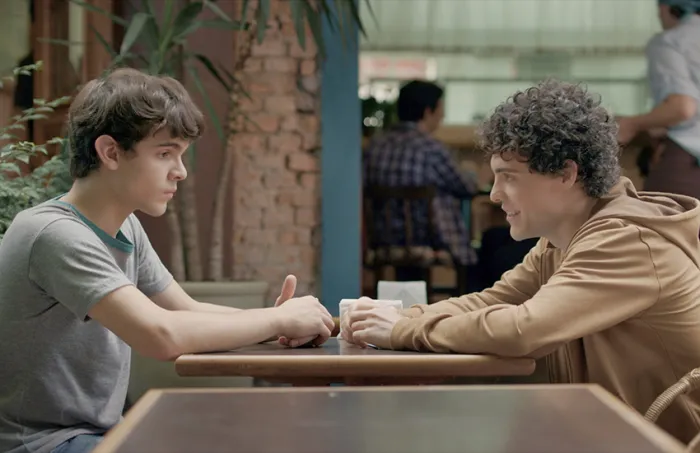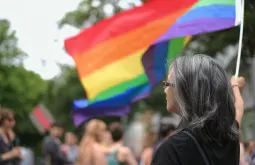Being gay in South America get two radically different treatments in brazilian. Venezuelan features at the Cartagena Film Festival

When the new kid in school, Gabriel, leaned in to peck his blind classmate Leo on the lips, the audience at Latin America’s premier film festival let out a collective gasp.
There’s nothing remotely racy about “The Way He Looks,” a tender romantic comedy about the budding romance between Leo and Gabriel, but even so, the crowd buzzed with nervous titters every time the two protagonists flirted or even eyed one another. And then at the end of the squirmy session, even before the credits start rolling, the audience burst into cheers, and a crowd of snapshot-seekers enveloped director Daniel Ribeiro.
It was exactly how the 31-year-old Brazilian said he’d expected the movie to be received in South America, where homosexuality remains largely taboo despite recent legislative advances in several countries. Gays may be able to legally marry in Uruguay and Brazil and form legally-sanctioned civil unions in Argentina, but being out in South America continues to be a fraught, indeed dangerous, proposition throughout much of the continent.
“The Way He Looks” is one of two films in competition at the Cartagena Film Festival to grapple with the issue. While it casts coming out in Brazil in an almost blithely sunny light, the gritty Venezuelan family drama “Pelo Malo” highlights the weight that social stigma against homosexuality still carries in machista Latin America.
The movie’s protagonist Junior, a doe-eyed nine-year-old living in a Caracas housing project where the staccato of automatic gunfire is just another everyday sound, dreams of growing up to be a singer. He’s always breaking into song, and when he joins in with a group of neighbor boys breakdancing in the corridor, he closes his eyes and sways, rapt, to the rap music.
His mother, Marta, a security guard whose mercurial temper cost her her job, eyes her son with suspicion. She switches seats on the bus to get away from his singing and roughs him up when she catches him in the bathroom trying to straighten his shock of kinky hair with canola oil or a mayonnaise concoction.
Only when she visits the local doctor to plead he help “fix” Junior do we understand the reason behind her contempt.
“Can’t you do something to make him straight,” she asks with the doctor. “Life will be so hard for him if he turns out gay.”
Homosexuality is barely tolerated in Venezuela, where gays don’t enjoy any of the legal protections afforded homosexuals in other South American nations like Brazil, Argentina and Uruguay, which legalized gay marriage last year. An anti-discrimination bill initially proposed in the late 1990s has stalled repeatedly, and homophobic killings continue to happen regularly. In 2012, in Maracay, a city of one million inhabitants just west of Caracas, a gay teenager was doused in gasoline and burned alive. Local papers reported the 18-year-old’s assailants were out to “cleanse” the area of homosexuals.
The specter that Junior might someday suffer a similar fate casts a pall over “Pelo Malo,” infusing the whole movie with A sense of foreboding. The film – which took the grand prize at the San Sebastian Film Festival in September – never makes any direct mention of the teen set alight, nor to any of the nearly 100 homophobic hate crimes that are estimated to have taken place in Venezuela over the past five years. And yet there’s the sense that menace is waiting in the wings.
When a group of older boys pause their basketball game to jeer at Junior as he walks by, we begin to understand Marta’s choice: Given the circumstances of today’s Venezuela, it still seems better to deny a child his mother’s love than risk losing the child altogether.
The depiction of homosexuality in “The Way He Looks,” the Brazilian rom-com, is on the other end of the spectrum. In the movie, the decision to come out of the closet comes off as roughly as weighty a choice as choosing a salad dressing.
Brazil has a reputation as a gay-friendly country, but outside a few pockets of tolerance in Rio de Janeiro, Sao Paulo and a handful of other big cities, the country remains overwhelmingly homophobic. In 2012, the last year for which data is available, 338 homosexuals were murdered because of their sexual orientation, according to the Grupo Gay da Bahia, an advocacy organization.
In the movie, though, the biggest obstacles to Leo and Gabriel’s budding love story are neither fears of homophobic assaults nor harassment but rather a fit of jealousy by their friend Giovanna and a series of capers by the school’s annoying but ultimately harmless resident prankster.
In Ribeiro’s sanitized Brazil – which, with its tidy streets and well-dressed white people driving sedans, looked more like Greater Boston than anywhere actually in the country – teachers, parents and the boys’ classmates all assimilate their couple status with hardly a batted eyelash.
In fact, the audience at the Cartagena Film Festival, where the film made its Latin American premier on Saturday, appeared to have a much harder time digesting Leo’s coming out than did the character’s unsuspecting friends and family.
“In Europe … no one gasped during the love scenes or anything,” said Ribeiro, whose debut feature film is based on his prize-winning 2010 short. “But for a lot of viewers in Colombia or other places in South America, seeing a gay love story is kind of breaking a taboo.”
The goal, said Ribeiro, was to make puppy love between two young men seem just as natural and non-threatening as the quarterback asking the cheerleader to go steady. Perhaps that’s also why Ribeiro gives the sensual realm a wide berth, scrubbing the script clean of anything remotely raunchy or even suggestive. Despite their raging adolescent hormones, the protagonists never engage in anything more pulse-quickening than a kiss – and the only two in the whole movie are of the non-French variety, at that.
“The Way He Looks” comes off as a feature-length act of wishful thinking – for a white-picket Brazil in which being gay is as much a non-issue as being tall or having freckles – and not something shameful that could potentially get you killed.
Director Ribeiro’s strategy appears to have succeeded, at least at the box office. While “Pelo Malo,” with its dark but reality-bound outlook is struggling to find distributors in Latin America despite its prize, rights for “The Way He Looks” have been sold in 16 countries and counting, including several in South America.
By the end of the screening at the Cartagena Film Festival, the audience that had started the session with gasps and groans was hooting its approval. After the screening, Ribeiro spent around nearly an hour shaking spectators’ hands, signing autographs and posing for endless cellphone photos.






